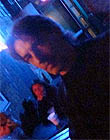|
|
This topic comprises 2 pages: 1 2
|
|
Author
|
Topic: Sensitivity to dirt and scratching on BDs
|
Leo Enticknap
Film God

Posts: 7474
From: Loma Linda, CA
Registered: Jul 2000
|
 posted 12-10-2011 06:12 AM
posted 12-10-2011 06:12 AM





I have now had several occasions when both the BD drive in my computer and the player in the projection booth at work have frozen and stopped with a read error. The reason has always been fingerprint marks, dirt or scratches on the disc. On all but one occasion, cleaning the playing surface with some isopropanol and a lens cloth has solved the problem, and the one disc for which it didn't had a deep lateral scratch on it, which was beyond help.
It does strike me that BDs are more sensitive than DVDs to contamination on the playback surface. I've played DVDs in a similar condition, without bothering to clean them and with no problem. Given that the size of each data pit and thus the laser beam is so much smaller, that makes logical sense I guess: it takes a physically smaller and less dense bit of crap to prevent the laser beam from reaching and bouncing off the pit of a BD than a DVD.
It does make me wonder, though, whether, once arthouses start screening BDs on a regular basis as a cheap alternative to film prints (in the way that some already do with DVDs), if we aren't going to have quite a few disrupted shows.
| IP: Logged
|
|
|
|
|
|
Paul Mayer
Oh get out of it Melvin, before it pulls you under!

Posts: 3836
From: Albuquerque, NM
Registered: Feb 2000
|
 posted 12-10-2011 11:42 AM
posted 12-10-2011 11:42 AM





More than likely Leo, or at least it will become a much more widespread practice to do check screenings/disc cleanings before shows. But with consumer discs, even a successful pre-screening doesn't guarantee that the next playback will be glitch-free. I imagine those screens that had reputations for showing dirty scratched prints in the film days will continue their crap media handling practices and have reputations for skipping and freezing and cancelled shows.
Yeah, the BD format is more sensitive to physical contamination. When the format was being developed, it was predicted that there would be such issues. One of the proposed solutions was to enclose the discs in caddies to minimize the exposure of the discs to contamination. But that method was ultimately deemed to be too cumbersome to use in a consumer format. In the end the BD format ended up with an extra scratch-resistant layer applied to the surface of the disc. Still, BDs are rather delicate things.
I like Gordon's observation. It's probably best for a professional operation to rip the BD to a hard drive and then do playback from the drive. I'm building my first HTPC and will be playing with doing such things for my future private screenings. Having the file on hard disc also gives one the chance to remove all the extra stuff that won't be needed/wanted during playback (extra soundtrack languages, subtitles, home video labels, etc.).
| IP: Logged
|
|
|
|
|
|
|
|
|
|
|
|
|
|
|
|
|
|
|
|
|
|
|
|
|
|
All times are Central (GMT -6:00)
|
This topic comprises 2 pages: 1 2
|
Powered by Infopop Corporation
UBB.classicTM
6.3.1.2
The Film-Tech Forums are designed for various members related to the cinema industry to express their opinions, viewpoints and testimonials on various products, services and events based upon speculation, personal knowledge and factual information through use, therefore all views represented here allow no liability upon the publishers of this web site and the owners of said views assume no liability for any ill will resulting from these postings. The posts made here are for educational as well as entertainment purposes and as such anyone viewing this portion of the website must accept these views as statements of the author of that opinion
and agrees to release the authors from any and all liability.
|

 Home
Home
 Products
Products
 Store
Store
 Forum
Forum
 Warehouse
Warehouse
 Contact Us
Contact Us




 Printer-friendly view of this topic
Printer-friendly view of this topic


















